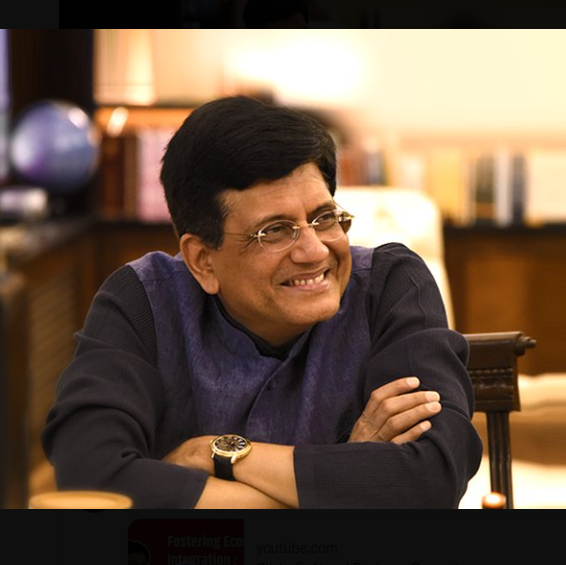The Union Commerce Minister says India’s transformational journey since 2014 under the leadership of PM Modi is now recognised globally, draws attention to Morgan Stanley research report
Piyush Goyal calls for early convergence of efforts of 5 top institutions – NIFT, IPP, NID, FDDI and IIFT; also emphasizes need for industry-academia partnership
New Delhi, NFAPost: Union Minister of Textiles, Commerce & Industry Piyush Goyal said that fashion trends, product design, innovative packaging, high quality of goods and services and high exports are going to determine India’s success story in the future. He said this while chairing the ‘National Workshop on Convergence of Five Institutes’ held in New Delhi today.
The unique initiative to bring about convergence of the five institutes under the Ministry of Textiles and Commerce and Industry was initiated in 2022.
The collaboration between five Institutes namely, Indian Institute of Packaging (IPP), National Institute of Fashion Technology (NIFT), National Institute of Design (NID), Footwear Design and Development (FDDI) and Indian Institute of Foreign Trade (IIFT), has the ability to build a more dynamic and integrated national design and business education ecosystem that benefits students, industries, and society as a whole.
The convergence will lead to integration of knowledge, techniques, and expertise from multiple fields will facilitate transdisciplinary integration among different unique institutions in tune with the objectives of the National Education Policy 2020.
Union Minister of Textiles, Commerce & Industry Piyush Goyal said that India’s transformational journey since 2014 under the leadership of the Prime Minister Narendra Modi is now recognised globally, and drew attention to Morgan Stanley research report which also recognizes how India has emerged as a key driver for Asian and global growth.
“The recently released high GDP growth estimates for FY 2023-24 and attributed it to the visionary guidance of the Prime Minister. These high estimates make every Indian proud as it’s a recognition of the efforts made by the Government over the last 9 years across the world,” said Union Minister of Textiles, Commerce & Industry Piyush Goyal.
Piyush Goyal appreciated the presentations given in the workshop by the participants and urged the concerned Ministries to work towards implementation of the ideas in the presentation within allocated timelines. He said that the ideas deliberated upon in the workshop must be given proper shape and implemented for effective utilisation of such workshops.
The Minister said that the National Education Policy 2020 aims to change the mindset pertaining to education by changing the curriculum and making it more inclusive and dynamic. He said that the Policy encourages critical thinking amongst the students to help them in their career.
He said that the convergence initiative of the five institutes under the Ministry of Textiles and Commerce and Industry will not only strengthen the institutes but also the Industry academia partnership. He said that this will result in the institutes’ success story being determined by minimal strict government interference as self sufficiency is the best module for success.
Union Minister of Textiles, Commerce & Industry Piyush Goyal said that higher intake must be explored in these institutions as there is a huge demand for designers, fashion specialists, etc.
“The institutes must work towards developing skills related to finance, entrepreneurship, personality development, ability to face challenges in life, etc. amongst their students. Credit systems can be developed amongst these institutions to provide more flexibility for students to move from one institution to another and offer dual degree courses,” said Union Minister of Textiles, Commerce & Industry Piyush Goyal.
The Union Minister also highlighted the role played by the alumni of these institutions with respect to donation, faculty, mentorship, etc. He stressed upon the need to focus on better placements from these institutes. He also suggested enhanced engagement with the industry for better overall development of the institutes and also offering curriculum which can help the students in the workplaces.
A national workshop was organised by NIFT at New Delhi on 31st May and 1st June 2023. Academia, alumni and industry were invited by each of the institutes to deliberate through joint presentations followed by breakout sessions to go into the details of functionality of common ideas.
The first day of the workshop was held at NIFT Campus in New Delhi and Union Minister of Textiles, Commerce & Industry, Consumer Affairs and Food & Public Distribution, Shri Piyush Goyal chaired the session on the second day of the workshop on 1st June 2023 at Vanijya Bhawan, New Delhi. The session was attended by the senior officials from the Ministry of Textiles and Ministry of Commerce and Industry.
This initiative of convergence was to discuss and ponder upon common issues of these educational institutes such as placements, admissions, policies for students’ welfare or ways to incentivize faculty and administration. The idea was to brainstorm and learn from each other’s best practices and finding innovative ways to share infrastructure, faculty and international linkages.
Alumni and industry representatives were part of the exercise. The objective is to encourage convergence between the institutes in order to foster an industry-academia interface and build a global professional network through engagement with the alumni of these institutes.
The initiative of convergence can also be looked upon as the first step towards building synergies, asserting India’s tremendous brain power and project our identity not just in terms of our traditional culture but also in terms of the tremendous progress we have made in terms of modernity in our professional education, competing with the best in the world, and training professionals in a multidisciplinary context.
These five institutes are specialized institutions and hold a unique place in professional education in the country. Some are known for design and some for their state of the art technology, however, each institute has a specific product/object orientation. The benefits due to convergence are Global competency, Knowledge sharing, Enhancing self-efficiency, Workforce development and Optimum usage of resources.
The five Institutes have held a series of online and offline meetings. Deliberations and work have been done to pave the path to achieve the following objectives: Convergence within Institutes, Student Promotional Schemes, Admission Process and Growth in student enrolment, Creating a Professional Network of Alumni and Industry-Academia Collaboration.





